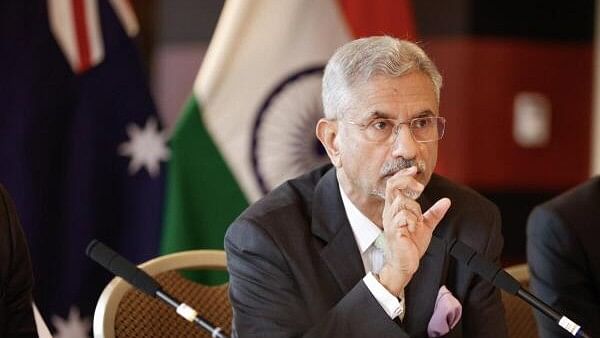
External Affairs Minister S Jaishankar during a meeting with CEOs and business leaders, in Sydney, Australia.
Credit: PTI Photo
New Delhi: Even the incoming administration of Donald Trump in Washington DC will have to make a distinction between mobility and immigration, External Affairs Minister S Jaishankar said on Thursday, amid speculation that the professionals from India might find it difficult to get visas to work in the United States after the return of the 78-year-old Republican to the White House.
Jaishankar also said that Trump’s return as the US president might lead to “more geopolitical hedging” by all nations around the world.
The external affairs minister noted at an event in Sydney on Thursday that the world would see a much more integrated workforce in the next few years.
“Even a US under Donald Trump will make a distinction in immigration and mobility for them. An economically justified mobility will have to be fostered by those countries, where the economic value is less or negative (and) will have to be managed” he said, addressing the business leaders of Australia.
His comment came a day after Trump, the 45th US president, won the elections to return to the Oval Office in the White House as the 47th.
Trump promised during his campaign for re-election that he would build on the measures taken during his first term in the White House to drastically bring down both legal and illegal migration to the US.
He accused President Joe Biden of allowing “terrorists,” “common street criminals,” and “drug dealers” to enter the US.
New Delhi anticipates that the second Trump Administration, while pursuing its “Make American Great Again” policy, might make it difficult for India’s Information Technology professionals to get non-immigrant work visas to work in the US, just as it had done during his first term from 2017 to 2021 when the H1B visa denial rate had gone up from 6% in 2016 to 24% in 2018 before coming down to 21% in 2019.
Biden had allowed the restrictions imposed by Trump on the grant of non-immigrant US visas to lapse in March 2021.
The US granted 3.86 lakh H1B visas in 2023 and Indians, mostly IT professionals, accounted for 72.3% (2.79 lakh) of the recipients.
Jaishankar, however, argued that the Trump Administration would have to draw the line between illegal immigration and mobility of professionals driven by the need of the economy. “Even as there is a re-globalisation, or reworking of the current architecture, apart from the technological changes, I think, the demographic unevenness of the world is beginning to bite us,” said Jaishankar, who was on a five-day tour to Australia. There would be economies where the demand would be high but the talents might not be plentiful and the scene might be different in other places, he added.
“And now the global workplace doesn't mean that the talent alone has to move. Businesses can move as well,” he said, adding that India had already seen that happening in the last few years. “At the last count, we have about 1,800 global capability centres in India, which, between them, generate about $ 150 billion worth of experts.” He noted that the trend would continue as the more technology driven, more digital era would require a certain concentration of and access to skills and talent.
“So, whether the talent goes to the business, or the business goes to the talent, that's a decision which the corporates will be making.”
Jaishankar also spoke about the possibility of re-ordering of supply chains accelerating after Trump’s return as the US president in January 2025. “I'll be very candid with you, that some of this will be somewhat disruptive, but we in India perceive it as an opportunity because we have missed the manufacturing bus in the 1990s, early 2000s," said the external affairs minister.
He said that Trump’s return to the White House would also lead to more geopolitical hedging. “Many more of us would be seeking more relationships (globally) to keep life stable,” he added.
